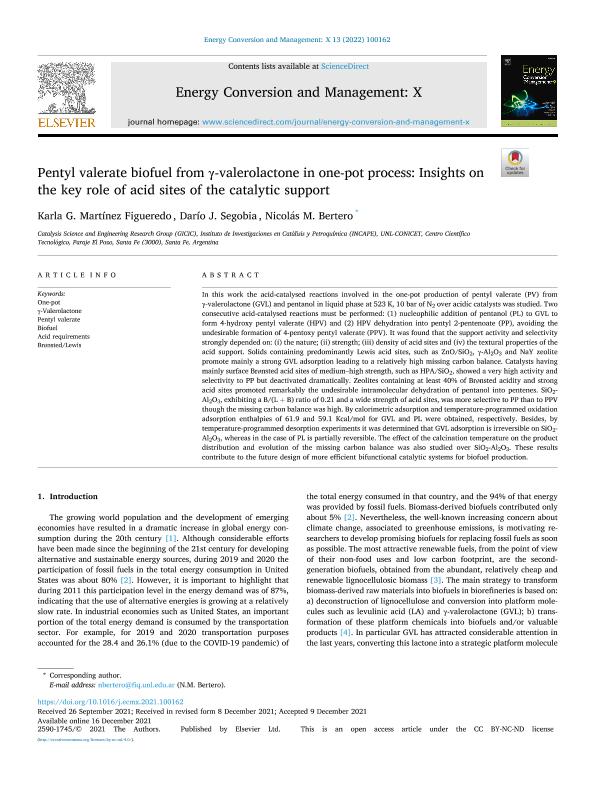Artículo
Pentyl valerate biofuel from γ-valerolactone in one-pot process: Insights on the key role of acid sites of the catalytic support
Fecha de publicación:
01/2022
Editorial:
Elsevier
Revista:
Energy Conversion and Management: X
ISSN:
2590-1745
Idioma:
Inglés
Tipo de recurso:
Artículo publicado
Clasificación temática:
Resumen
In this work the acid-catalysed reactions involved in the one-pot production of pentyl valerate (PV) from γ-valerolactone (GVL) and pentanol in liquid phase at 523 K, 10 bar of N2 over acidic catalysts was studied. Two consecutive acid-catalysed reactions must be performed: (1) nucleophilic addition of pentanol (PL) to GVL to form 4-hydroxy pentyl valerate (HPV) and (2) HPV dehydration into pentyl 2-pentenoate (PP), avoiding the undesirable formation of 4-pentoxy pentyl valerate (PPV). It was found that the support activity and selectivity strongly depended on: (i) the nature; (ii) strength; (iii) density of acid sites and (iv) the textural properties of the acid support. Solids containing predominantly Lewis acid sites, such as ZnO/SiO2, γ-Al2O3 and NaY zeolite promote mainly a strong GVL adsorption leading to a relatively high missing carbon balance. Catalysts having mainly surface Brønsted acid sites of medium–high strength, such as HPA/SiO2, showed a very high activity and selectivity to PP but deactivated dramatically. Zeolites containing at least 40% of Brønsted acidity and strong acid sites promoted remarkably the undesirable intramolecular dehydration of pentanol into pentenes. SiO2-Al2O3, exhibiting a B/(L + B) ratio of 0.21 and a wide strength of acid sites, was more selective to PP than to PPV though the missing carbon balance was high. By calorimetric adsorption and temperature-programmed oxidation adsorption enthalpies of 61.9 and 59.1 Kcal/mol for GVL and PL were obtained, respectively. Besides, by temperature-programmed desorption experiments it was determined that GVL adsorption is irreversible on SiO2-Al2O3, whereas in the case of PL is partially reversible. The effect of the calcination temperature on the product distribution and evolution of the missing carbon balance was also studied over SiO2-Al2O3. These results contribute to the future design of more efficient bifunctional catalytic systems for biofuel production.
Archivos asociados
Licencia
Identificadores
Colecciones
Articulos(INCAPE)
Articulos de INST.DE INVEST.EN CATALISIS Y PETROQUIMICA "ING. JOSE MIGUEL PARERA"
Articulos de INST.DE INVEST.EN CATALISIS Y PETROQUIMICA "ING. JOSE MIGUEL PARERA"
Citación
Martínez Figueredo, Karla Geraldine; Segobia, Dario Jobino; Bertero, Nicolas Maximiliano; Pentyl valerate biofuel from γ-valerolactone in one-pot process: Insights on the key role of acid sites of the catalytic support; Elsevier; Energy Conversion and Management: X; 13; 1-2022; 100162-100174
Compartir
Altmétricas




